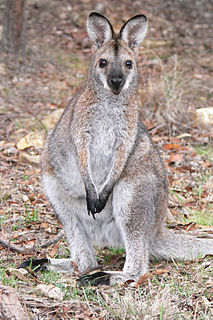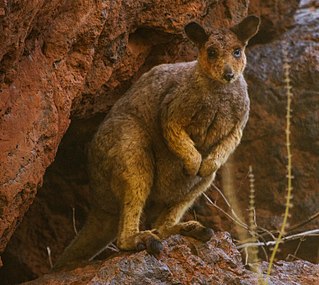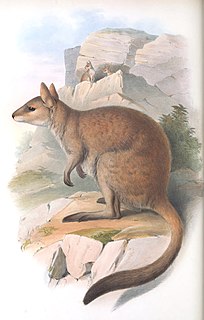
A wallaby is a small or middle-sized macropod native to Australia and New Guinea, with introduced populations in New Zealand, Hawaii, the United Kingdom and other countries. They belong to the same taxonomic family as kangaroos and sometimes the same genus, but kangaroos are specifically categorised into the four largest species of the family. The term "wallaby" is an informal designation generally used for any macropod that is smaller than a kangaroo or a wallaroo that has not been designated otherwise.

Macropodidae is a family of marsupials that includes kangaroos, wallabies, tree-kangaroos, wallaroos, pademelons, quokkas, and several other groups. These genera are allied to the suborder Macropodiformes, containing other macropods, and are native to the Australian continent, New Guinea and nearby islands.

The brush-tailed rock-wallaby or small-eared rock-wallaby is a kind of wallaby, one of several rock-wallabies in the genus Petrogale. It inhabits rock piles and cliff lines along the Great Dividing Range from about 100 km north-west of Brisbane to northern Victoria, in vegetation ranging from rainforest to dry sclerophyl forests. Populations have declined seriously in the south and west of its range, but it remains locally common in northern New South Wales and southern Queensland. However, due to a large bushfire event in South-East Australia around 70% of all the wallaby's habitat has been lost as of January 2020.

Godman's rock-wallaby is a diprotodont marsupial, and a typical rock-wallaby. It is found in northern and north-eastern Queensland, Australia. This rock-wallaby is found in low open forest, open scrub, or montane regions, often near the coast. It shelters in rocky terrain adjacent to feeding areas. Godman's rock-wallaby is a nocturnal gregarious territorial folivore.

The purple-necked rock-wallaby is a species of rock-wallaby first described in 1924 by Albert Sherbourne Le Souef, then director of the Taronga Zoo in Sydney, Australia, who noted a purple colouration around the neck and cranial features that distinguish it from other rock-wallaby species.

The yellow-footed rock-wallaby, formerly known as the ring-tailed rock-wallaby, is a member of the macropod family.

The black-flanked rock-wallaby, also known as the black-footed rock-wallaby or warru, is a species of wallaby, one of several rock-wallabies in the genus Petrogale. A shy, nocturnal herbivore, its two main subspecies are found in mostly isolated populations across western and southern Western Australia (WA), the Northern Territory and parts of South Australia (SA). With some subspecies showing a decline in populations in recent years, the whole species is classed as an endangered species under the Commonwealth EPBC Act.

The rock-wallabies are the wallabies of the genus Petrogale.

The short-eared rock-wallaby is a species of rock-wallaby found in northern Australia, in the northernmost parts of the Northern Territory and Western Australia. It is much larger than its three closest relatives, the eastern short-eared rock-wallaby, the nabarlek and the monjon.

The monjon is the smallest species of rock-wallabies (Petrogale) and is found in north-west Australia. They are restricted to a small area of the Kimberley region and on nearby islands in the Bonaparte Archipelago. Common names also include Burbidge's rock-wallaby and Burbidge's rock-weasel.

Nabarleks, are a tiny species of macropod found in northern Australia. They are a shy and nocturnal animal that resides in rocky hollows and forages in the surrounding area. Their diet is grasses, sedges, and ferns found in and around their scrub covered refuges. They are distinguished by a reddish tinge to the mostly grey fur and a distinct stripe at the cheek. They move with great speed and agility when observed, with a forward leaning posture and a bushy tail that arches over the back.

The Proserpine rock-wallaby is a species of rock-wallaby restricted to a small area in Conway National Park, Dryander National Park, Gloucester Island National Park, and around the town of Airlie Beach, all in Whitsunday Shire in Queensland, Australia. It is a threatened species, being classified by the IUCN as endangered.

Rothschild's rock-wallaby – sometimes known as the Roebourne rock-wallaby, is a species of macropod found in Western Australia, in the Pilbara district and the Dampier Archipelago. It is not currently considered to be threatened, but is at risk from the red fox.

The allied rock-wallaby or Weasel rock-wallaby is a species of rock-wallaby found in northeastern Queensland, Australia. It forms part of the P. lateralis/penicillata species complex and is very similar to six other species of rock-wallaby found in this area; these include the Cape York rock-wallaby, the unadorned rock-wallaby, the Herbert's rock-wallaby, the Godman's rock-wallaby, the Mareeba rock-wallaby and the Mount Claro rock-wallaby.

The Cape York rock-wallaby is a species of rock-wallaby restricted to Cape York Peninsula in northeastern Queensland, Australia. It is a member of a group of seven very closely related rock-wallabies, all found in northeastern Queensland, also including the Mount Claro rock-wallaby, the Mareeba rock-wallaby and Godman's rock-wallaby.

Herbert's rock-wallaby is a member of a group of seven very closely related rock-wallabies found in northeastern Queensland, Australia. Herbert's is the most southerly and most widespread of the group.

The Mareeba rock-wallaby is a rare species of rock-wallaby found around Mareeba in northeastern Queensland, Australia.

The Mount Claro rock-wallaby, also known as Sharman's rock-wallaby, is a species of rock-wallaby found in northeastern Queensland, Australia. It is a member of a group of seven very closely related species also including Godman's rock-wallaby and Herbert's rock-wallaby.
Buckaringa Sanctuary is a 20 km2 nature reserve in the southern Flinders Ranges of South Australia. It is 30 km north of the town of Quorn. It is owned and managed by the Australian Wildlife Conservancy (AWC).



















